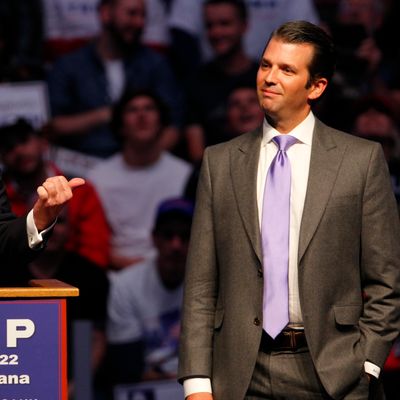
Many figures in Donald Trump’s orbit have been caught denying contacts with Russia that have later surfaced. What’s unusual about the lies that Donald Trump Jr. tells is that they aren’t even exculpatory. His denials are closer to confessions.
After the New York Times reported Saturday that Donald Jr. had met with Russian officials during the campaign, contradicting his previous statement, he explained that the meeting concerned nothing more serious than the issue of adoptions. “It was a short introductory meeting. I asked Jared and Paul to stop by. We primarily discussed a program about the adoption of Russian children that was active and popular with American families years ago and was since ended by the Russian government, but it was not a campaign issue at the time and there was no follow up.”
Of course, as the Times story explains, the adoption issue is hardly a nonpolitical question. One of the Russian government’s highest priorities is to repeal an American law, named after a murdered Russian dissident who exposed corruption at the hands of Vladimir Putin, which allows financial penalties for Russian human-rights violators. Natalia Veselnitskaya, the Russian lawyer who met with the Trump campaign, is spearheading this effort. Russia retaliated for the hated law by suspending American adoptions of Russian children: A discussion of adoption inherently implies a discussion of favors to be granted to Putin’s regime.
By Sunday, even this explanation had collapsed, as the Times reported that the Russians had offered damaging information on the Clinton campaign. In a new statement to the Times, Donald Jr. says that the dangled information was merely a ruse:
“After pleasantries were exchanged,” he said, “the woman stated that she had information that individuals connected to Russia were funding the Democratic National Committee and supporting Ms. Clinton. Her statements were vague, ambiguous and made no sense. No details or supporting information was provided or even offered. It quickly became clear that she had no meaningful information.”
So the Trump campaign took a meeting with Russians who promised to supply them with damaging information on their opponent. This is the defense. Given that Trump is fervently denying that his campaign colluded with Russia to steal and disseminate Democratic emails, it is not a very strong one.
Trump Jr.’s latest defense is that while he sought damaging information from Veselnitskaya, she failed to deliver any. However, the timing of events around this meeting is instructive. The hacker Guccifer announced the theft of Clinton emails the month before, and Guccifer’s only publicly known connection to Russia was his use of Russian proxy servers. But three days after the meeting with the Trump campaign, Julian Assange, Putin’s pass-through publishing source for email hacks, announced, “We have upcoming leaks in relation to Hillary Clinton … We have emails pending publication, that is correct.”
The most interesting follow-up question is, what was the nature of the damaging information that Veselnitskaya promised? Stolen emails, perhaps?
Update: Trump Jr.’s statement not only implicates him in the potential crime of requesting an electronic break-in, it apparently implicates him in a already-proven one. As Rick Hasen and Bob Bauer point out, federal law prohibits a campaign from soliciting anything of value from foreign entities. (“No person shall knowingly solicit, accept, or receive from a foreign national any contribution or donation prohibited by paragraphs (b) through (d) of this section.”) Trump Jr.’s own statement presents him as soliciting something of value.






























